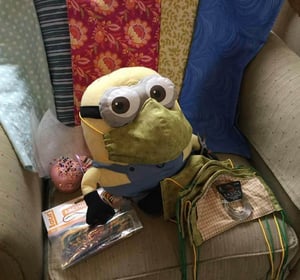| Kate Cebik walking sewists through maskmaking techniques earlier this year. MakeHaven Photos. |
MakeHaven members and volunteers exchanged greetings as they sat down to sew together on Google Meet. Three months ago they were an in-person sewing circle. Now, they’ve gone virtual because of a global pandemic.
Since March, over 100 sewists—a new term that combines “sew” and “artists”—have been busy making masks for the New Haven community. Their experience levels range from costume makers to beginner level sewer. They have formed a community to fill the need for PPE (personal protective equipment) during the COVID-19 pandemic.
The group is the brainchild of MakeHaven Operations Manager Kate Cebik and Shop Manager Lior Trestman, who have organized bi-weekly online sewing circles for the last three months. The two see them as a time for people to connect while making masks and feel a sense of community during quarantine. The circles also have been a place to share information and experiences.
“I’d like to start with a cautionary tale,” said member Anne Killheffer at the beginning of the call. “I might be the last person to know this, but I did not realize that the elastic that I had purchased shrinks if you run it through hot water and then the electric dryer.”

Another sewist joked that if the timing were different, she would have recommended returning the elastic. But in the midst of a pandemic, this wasn’t the best option. The link to buy the elastic went into the chat; sewists advised each other to cut elastic slightly longer and to prewash it.
Cebik also shared requests she had received from organizations asking for clear masks. The masks help lip readers and people who work with children, Cebik explained.
“Babies really need facial expressions,” added member Sarah Bromely. “I work in childcare, and that would really help the infants I work with not freak out.”
The circle learned the drawbacks of hosting the circle virtually when a sewist tried to show a mask that he’d made with a clear pane. Navigating to a specific person’s screen proved difficult in Google Meet, so not everyone was able to fully appreciate his mask.
Cebik explained that as the project has grown, simply having people with sewing skills isn’t enough to make the mask project work alone. Gathering materials has also been essential.
“The Eli Whitney Museum has been excellent,” Cebik said. “Donating elastic from the beginning, which kept us going when elastic was unavailable.”
The museum has also donated pipe cleaners and t-shirt material. The sewing circle also received a large spool of metal wire from Ulbrich Steel. Sewists can leave masks at four different dropoff locations in New Haven. They also can pick up kits with materials from the same locations.
So far, MakeHaven has sewn and delivered over 3,100 masks. The space also has received requests from organizations such as BHcare, Yale-New Haven Hospital, and St. Vincent’s Hospital, as well as soup kitchens and nursing homes.
Cebik said her favorite part of this project is “the community coming together and being able to help fill a need, especially for those who are caring for others.”
MakeHaven is currently accepting donations, including equipment and supplies, through an online form. Donations go to individual sewists who need work during these times. Those who are looking to join MakeHaven’s ranks of sewists can register here. Cebik said they have made massive contributions to alleviating the PPE shortage but there are still many more masks to be made.
“MakeHaven's mission is to equip people with tools to design, invent, and create,” she said. “Even when things look totally different, supporting makers is central to what we do. So when the need to make masks came up, it made sense for us to help.”
This piece comes to the Arts Paper through the third annual Youth Arts Journalism Initiative (YAJI), a program of the Arts Council of Greater New Haven. This year, YAJI has gone virtual. Read more about the program here or by checking out the"YAJI" tag.